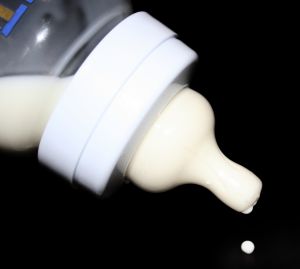
Water is good for you. But when water, formula, milk or juice is stored in a container that leaches chemicals, the nourishing drink that you’ve prepared for your baby turns into something more – a chemical soup that you don’t want anyone to drink, let alone your child. Recently, there has been a lot of concern over a specific chemical, BPA.
What are the concerns with chemicals in baby bottles and cups? As plastics are heated in the microwave or the dishwasher, they can release chemicals like Bisphenol A (BPA). This particular chemical mimics the female hormone estrogen, and too much of this chemical has been linked to cancer, decreased fertility, and diabetes. Yum, yum. If you’re pumping or using formula, you are going to need bottles. Leaching is more likely to happen when bottles or containers are heated, but bottles also need to be warmed. They also need to be cleaned and sterilized with heat. Seek out glass bottles from companies like Evenflo, which carries its Classic line of tempered glass bottles. These come in different sizes and can be paired with silicon nipples. Silicon is relatively inert and is a good choice for a bottle nipple. If you are storing your breast milk, choose storage containers that are BPA-free, like Medela or Lansinoh. Avoid #3 and #7 plastics, since these may contain BPA.
When your baby is ready for a sippy cup, there are a number of new alternatives. Stainless steel water bottles now dominate the market, and brands like Klean Kanteen even come with sippy cup attachments. Later, convert these bottles to normal water bottles with a new lid. If metal is too heavy for your little one, choose a BPA-free plastic cup like Born Free.
Are you concerned about toxins in baby bottles and cups?

